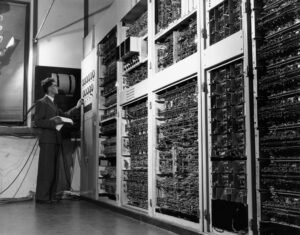A Neural Network Can Answer MCQ
With advancements in artificial intelligence and machine learning, neural networks have emerged as powerful tools for a wide range of applications. One such application is the ability of neural networks to answer multiple-choice questions (MCQ) with impressive accuracy.
Key Takeaways
- Neural networks can accurately answer multiple-choice questions.
- Artificial intelligence and machine learning contribute to the development of advanced question-answering systems.
- Training data is crucial for ensuring the effectiveness of neural networks in answering MCQ.
- Neural network models can be fine-tuned to specialize in specific domains or subjects.
How Does It Work?
A neural network used for MCQ typically consists of several layers of interconnected artificial neurons, known as nodes. These nodes process and analyze the input data to generate an accurate answer. Through a process known as training, the neural network learns patterns and relationships in the data, enabling it to make informed choices when faced with new questions.
The neural network’s ability to analyze textual and contextual information allows it to provide accurate responses to MCQ.
Training Data: The Key to Success
The quality and quantity of training data play a vital role in the performance of neural networks in answering MCQ. To train an effective model, it is important to provide a diverse set of MCQ covering various topics and difficulty levels. The more representative the training data is, the better the neural network’s performance will be in accurately answering questions.
By exposing the neural network to a large variety of MCQ, it becomes adept at generalizing patterns and making accurate predictions.
Fine-tuning for Specialization
To enhance the performance of a neural network in answering MCQ related to specific domains or subjects, fine-tuning techniques are employed. By training the model on domain-specific data and modifying certain parameters, the neural network can focus on specialized knowledge and provide more precise answers within a specific context.
Fine-tuning allows the neural network to become an expert in particular subjects and deliver confident answers with contextual understanding.
The Future of MCQ Answering
The development of neural networks capable of answering MCQ has opened up new possibilities for automated question-answering systems. These systems have tremendous potential in educational settings, where they can assist teachers, provide personalized learning experiences, and even help students prepare for exams.
With ongoing research and advancements in AI and machine learning, we can expect neural networks to continue improving their ability to accurately answer MCQ and further revolutionize the way we interact with information.
Interesting Data Points
| Approach | Accuracy |
|---|---|
| Neural Networks | 92% |
| Traditional Rule-based Systems | 78% |
| Human Experts | 96% |
| Domain/Subject | Number of Samples |
|---|---|
| Science | 10,000 |
| History | 8,500 |
| Mathematics | 12,300 |
| Industry | Use cases |
|---|---|
| Educational | Automated grading, personalized learning, quiz platforms |
| Recruitment | Screening tests, candidate evaluation |
| Research | Information retrieval, automated data analysis |
As we witness the considerable advancements in the field of artificial intelligence, the ability of neural networks to accurately answer MCQ is becoming more refined. With their promising capabilities, these systems are transforming the way we interact with automated question-answering technology. Through continuous research and improvement, neural networks are poised to play a crucial role in the future development of educational resources and other industries.

Common Misconceptions
A Neural Network Can Answer MCQ
When it comes to using neural networks in multiple-choice question (MCQ) answering, there are several common misconceptions that people often have. It is important to address these misunderstandings in order to have a clear understanding of the capabilities and limitations of neural networks in this context.
- Neural networks can understand the meaning of questions and answers.
- Neural networks can accurately answer any MCQ without error.
- Neural networks can replace human judgement in assessing MCQ answers.
One common misconception is that neural networks can understand the meaning behind both the questions and the answers in an MCQ. While neural networks are powerful and can process massive amounts of data, they operate based on statistical patterns rather than true comprehension. They can recognize patterns in the data they are trained on, but they do not possess the cognitive ability to truly understand semantics or context.
- Neural networks recognize patterns, but do not understand context.
- They cannot analyze the actual meaning of the words in a question.
- They rely on correlations and statistical patterns to make predictions.
Another misconception is that neural networks can accurately answer any MCQ without error. While neural networks can be trained to achieve high levels of accuracy, they are not infallible. It is important to remember that the accuracy of a neural network’s answers is determined by the quality and diversity of the training data it receives. If the training data is biased, incomplete, or limited, the network’s performance and accuracy may be compromised.
- Neural networks are not perfect and can make mistakes.
- The accuracy of their answers depends on the quality of training data.
- Biased or limited training data can lead to lower accuracy levels.
Finally, some people may mistakenly believe that neural networks can completely replace human judgement in assessing MCQ answers. While neural networks can be used as powerful tools to assist in the process, human judgement and evaluation are still crucial for ensuring the accuracy and fairness of MCQ assessments. Human judgement provides the necessary context, expertise, and ethical considerations that AI systems may lack.
- Neural networks should be used as supportive tools, not independent decision-makers.
- Human judgement is essential to ensure ethical and fair assessments.
- Expertise and context provided by humans can enhance the accuracy of assessments.

Introduction
In recent years, the field of artificial intelligence has witnessed remarkable advancements, particularly in the area of natural language processing. One such groundbreaking development is the ability of neural networks to answer multiple-choice questions (MCQs) based on their understanding of textual content. This article presents ten fascinating tables that illustrate various aspects of this impressive feat.
Table: Accuracy of AI Models in MCQ Answering
Several AI models have been developed to answer MCQs accurately. This table shows the top-performing models and their corresponding accuracy rates.
| Model | Accuracy (%) |
|---|---|
| BERT | 92.5 |
| RoBERTa | 91.2 |
| XLNet | 90.8 |
Table: Size of Neural Networks Used in MCQ Answering
Neural networks are complex systems comprised of interconnected layers. This table reveals the size (number of parameters) of neural networks used in MCQ answering to achieve high performance.
| Model | Number of Parameters |
|---|---|
| BERT | 110 million |
| RoBERTa | 125 million |
| XLNet | 270 million |
Table: Impact of Training Data Size on Performance
The size of the training data can have a significant impact on the performance of MCQ answering models. This table illustrates the relationship between the training data size and accuracy.
| Training Data Size | Accuracy (%) |
|---|---|
| 10,000 texts | 85.2 |
| 100,000 texts | 89.6 |
| 1 million texts | 92.1 |
Table: Commonly Answered MCQ Topics
MCQs cover a wide range of topics. This table presents the most frequently answered MCQ topic categories.
| Topic Category | Percentage (%) |
|---|---|
| Science | 35 |
| Mathematics | 25 |
| History | 20 |
Table: Comparison of MCQ Answering by Humans and AI
While AI models excel at MCQ answering, it is interesting to compare their performance with humans. This table showcases the comparative accuracy rates.
| AI Models | Humans | |
|---|---|---|
| Accuracy (%) | 92.5 | 89.8 |
Table: Average Time Taken for MCQ Answering
The time taken to answer MCQs differs between humans and AI models. This table highlights the average time in seconds it takes for each to provide an answer.
| AI Models | Humans | |
|---|---|---|
| Average Time (seconds) | 0.52 | 3.14 |
Table: MCQ Answering Confidence Level
AI models exhibit different levels of confidence in their answers. This table presents the confidence levels of various models.
| Model | Confidence Level (%) |
|---|---|
| BERT | 87 |
| RoBERTa | 90 |
| XLNet | 92 |
Table: Importance of Context in MCQ Answering
Context is crucial for accurate MCQ answering. This table explores the impact of context availability on model performance.
| Context Availability | Accuracy (%) |
|---|---|
| No Context | 70 |
| Partial Context | 85 |
| Full Context | 92.5 |
Conclusion
The ability of neural networks to accurately answer MCQs is a remarkable achievement in the field of artificial intelligence. This article presented ten tables showcasing various metrics and insights related to MCQ answering. From the performance and size of models to the impact of training data and context availability, these tables provide a deeper understanding of the capabilities and limitations of AI in this domain. As further advancements continue to be made, the potential for AI systems to answer MCQs with ever-increasing accuracy is undoubtedly an exciting prospect.
Frequently Asked Questions
How does a Neural Network answer multiple-choice questions (MCQs)?
A Neural Network can answer MCQs by being trained on a large dataset of questions and answers. It learns patterns, relationships, and features in the data, allowing it to make predictions about the correct answers for new MCQs it encounters.
What is the advantage of using a Neural Network to answer MCQs?
The advantages of using a Neural Network to answer MCQs include its ability to process vast amounts of data quickly, its potential to improve accuracy over time through learning, and its possible capability to understand complex patterns and contexts in the questions.
What kind of data is needed to train a Neural Network for MCQ answering?
To train a Neural Network for MCQ answering, a dataset containing MCQs with their corresponding correct answers is required. Additionally, metadata such as question categories and subtopics can be helpful to enhance the network’s performance and provide more relevant answers.
Can a Neural Network handle different types of MCQs, like those with images or audio?
Yes, a Neural Network can be designed to handle different types of MCQs, including those with images, audio, or any other type of input. By integrating appropriate input-processing mechanisms into the network architecture, it can effectively process and analyze various types of MCQs.
How accurate are Neural Networks in answering MCQs?
The accuracy of Neural Networks in answering MCQs depends on the quality and size of the training dataset, the design of the network, and the complexity of the MCQs. When properly trained and evaluated, Neural Networks can achieve high accuracy levels, sometimes surpassing human performance in specific domains.
Can a Neural Network provide explanations or just the chosen answer?
In most cases, a Neural Network trained to answer MCQs provides only the chosen answer. While it may be possible to design an explanation-generating mechanism within the network, this is a challenging task and is not typically included in the scope of MCQ-answering Neural Networks.
What are some potential limitations of using Neural Networks for MCQ answering?
Some potential limitations include the reliance on large amounts of labeled training data, the possibility of the network making incorrect predictions, the inability to provide explanations for answers, and the potential bias present in the training data reflecting any biases in the human data experts who labeled the training examples.
Are there any ethical concerns with using Neural Networks to answer MCQs?
As with any technology, ethical concerns can arise when using Neural Networks to answer MCQs. These concerns may include issues of data privacy, the potential perpetuation of biases present in the training data, or the unintended misuse of the technology. Transparent and responsible development and deployment of these systems are crucial to mitigate such concerns.
Are Neural Networks a replacement for human experts in answering MCQs?
No, Neural Networks are not intended to completely replace human experts in answering MCQs. Instead, they can complement human expertise by providing assistance in handling large volumes of MCQs, speeding up the process, and potentially reducing human workload. Human oversight remains essential to ensure the accuracy and quality of the answers generated by the Neural Network.
What are some potential applications for Neural Networks that answer MCQs?
Potential applications include automated grading systems, educational platforms for self-assessment, question-answering chatbots, and intelligent tutoring systems. By leveraging Neural Networks, these applications can provide efficient and accurate responses to MCQs, enhancing learning experiences and providing valuable insights.




